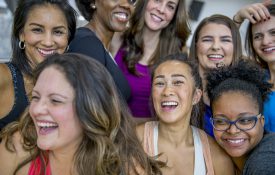-
Nobody likes a freeloader—including four-year-old kids
It may come as a shock to parents of young children, but preschoolers are more cooperative than we realize. In a novel study to find out how early our instinct for cooperation begins, Yale researchers performed an experiment with kids between the ages of four and 10. The goal was to find out how kids felt about “free riders”—people who fail to contribute to a common project, but reap the benefits from it. The result? Starting as young as four, kids turn out to dislike free riders intensely, “punishing” those who freeloaded even if they had good reason not to contribute.
-
‘Find your passion’? That’s bad advice, scientists say.
"Find your passion" is a mantra dictated to everyone from college students to retirees to pretty much anyone seeking happiness. But according to a forthcoming study from Stanford and Yale-NUS College in Singapore, it's actually bad advice - and may actually make it harder for people to figure out what they love to do. Why? The idea of "finding" one's passion implies that people have built-in interests just waiting to be discovered, and if you can simply figure out what they are you will magically be able to embrace them, says the study, which will be published in the journal Psychological Science.
-
New Research From Psychological Science
Read about the latest research published in Psychological Science: Mind-Body Practices and the Self: Yoga and Meditation Do Not Quiet the Ego but Instead Boost Self-Enhancement Jochen E. Gebauer, Andreas D. Nehrlich, Dagmar Stahlberg, Constantine Sedikides, Anke Hackenschmidt, Doreen Schick, Clara A. Stegmaier, Cara C. Windfelder, Anna Bruk, and Johannes Mander Yoga and meditation have entered the mainstream and are associated with significant benefits for physical and psychological well-being. Gebauer and colleagues conducted an empirical test of the psychological processes underlying these benefits. Participants were tested for several weeks before or after practicing yoga or meditation.
-

Ability to Identify Genuine Laughter Transcends Culture
People across cultures and continents are largely able to tell the difference between a fake laugh and a real one.
-
A pair of neuroscientists finds that investigating emotions is easier done than said
Ask a roomful of neuroscientists to define the term “emotion” and you will trigger a lively discussion. Some will argue that emotions involve conscious experiences that can be studied only in humans. Others might counter that insects and other invertebrates exhibit some of the emotion building blocks seen in mammals. Some will contend that different emotions correspond to anatomically distinct areas of the brain, whereas others argue that emotions are produced in a highly distributed manner. Still others will bring up the 19th-century psychologist William James’s argument that emotions are a consequence, not a cause, of behavior. In The Neuroscience of Emotion, Ralph Adolphs and David J.
-
Raising Brilliant Kids — With Research To Back You Up
"Why are traffic lights red, yellow and green?" When a child asks you a question like this, you have a few options. You can shut her down with a "Just because." You can explain: "Red is for stop and green is for go." Or, you can turn the question back to her and help her figure out the answer with plenty of encouragement. No parent, teacher or caregiver has the time or patience to respond perfectly to all of the many, many opportunities like these that come along. But one book, Becoming Brilliant: What Science Tells Us About Raising Successful Children, is designed to get us thinking about the magnitude of these moments.

